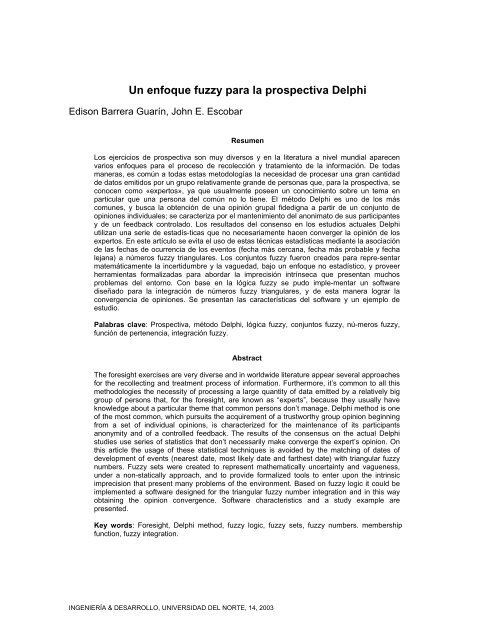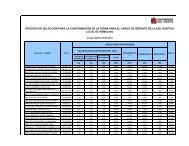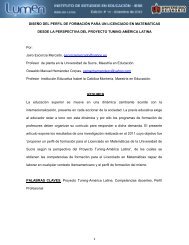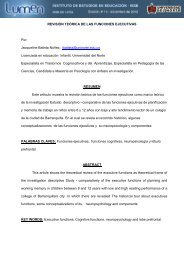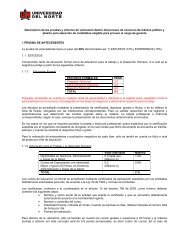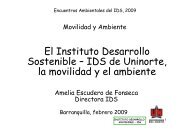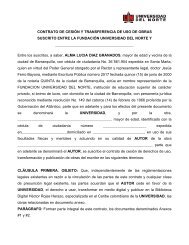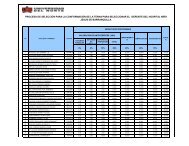IngenierÃa & Desarrollo - Universidad del Norte
IngenierÃa & Desarrollo - Universidad del Norte
IngenierÃa & Desarrollo - Universidad del Norte
Create successful ePaper yourself
Turn your PDF publications into a flip-book with our unique Google optimized e-Paper software.
Un enfoque fuzzy para la prospectiva Delphi<br />
Edison Barrera Guarín, John E. Escobar<br />
Resumen<br />
Los ejercicios de prospectiva son muy diversos y en la literatura a nivel mundial aparecen<br />
varios enfoques para el proceso de recolección y tratamiento de la información. De todas<br />
maneras, es común a todas estas metodologías la necesidad de procesar una gran cantidad<br />
de datos emitidos por un grupo relativamente grande de personas que, para la prospectiva, se<br />
conocen como «expertos», ya que usualmente poseen un conocimiento sobre un tema en<br />
particular que una persona <strong>del</strong> común no lo tiene. El método Delphi es uno de los más<br />
comunes, y busca la obtención de una opinión grupal fidedigna a partir de un conjunto de<br />
opiniones individuales; se caracteriza por el mantenimiento <strong>del</strong> anonimato de sus participantes<br />
y de un feedback controlado. Los resultados <strong>del</strong> consenso en los estudios actuales Delphi<br />
utilizan una serie de estadís-ticas que no necesariamente hacen converger la opinión de los<br />
expertos. En este artículo se evita el uso de estas técnicas estadísticas mediante la asociación<br />
de las fechas de ocurrencia de los eventos (fecha más cercana, fecha más probable y fecha<br />
lejana) a números fuzzy triangulares. Los conjuntos fuzzy fueron creados para repre-sentar<br />
matemáticamente la incertidumbre y la vaguedad, bajo un enfoque no estadístico, y proveer<br />
herramientas formalizadas para abordar la imprecisión intrínseca que presentan muchos<br />
problemas <strong>del</strong> entorno. Con base en la lógica fuzzy se pudo imple-mentar un software<br />
diseñado para la integración de números fuzzy triangulares, y de esta manera lograr la<br />
convergencia de opiniones. Se presentan las características <strong>del</strong> software y un ejemplo de<br />
estudio.<br />
Palabras clave: Prospectiva, método Delphi, lógica fuzzy, conjuntos fuzzy, nú-meros fuzzy,<br />
función de pertenencia, integración fuzzy.<br />
Abstract<br />
The foresight exercises are very diverse and in worldwide literature appear several approaches<br />
for the recollecting and treatment process of information. Furthermore, it’s common to all this<br />
methodologies the necessity of processing a large quantity of data emitted by a relatively big<br />
group of persons that, for the foresight, are known as “experts”, because they usually have<br />
knowledge about a particular theme that common persons don’t manage. Delphi method is one<br />
of the most common, which pursuits the acquirement of a trustworthy group opinion beginning<br />
from a set of individual opinions, is characterized for the maintenance of its participants<br />
anonymity and of a controlled feedback. The results of the consensus on the actual Delphi<br />
studies use series of statistics that don’t necessarily make converge the expert’s opinion. On<br />
this article the usage of these statistical techniques is avoided by the matching of dates of<br />
development of events (nearest date, most likely date and farthest date) with triangular fuzzy<br />
numbers. Fuzzy sets were created to represent mathematically uncertainty and vagueness,<br />
under a non-statically approach, and to provide formalized tools to enter upon the intrinsic<br />
imprecision that present many problems of the environment. Based on fuzzy logic it could be<br />
implemented a software designed for the triangular fuzzy number integration and in this way<br />
obtaining the opinion convergence. Software characteristics and a study example are<br />
presented.<br />
Key words: Foresight, Delphi method, fuzzy logic, fuzzy sets, fuzzy numbers. membership<br />
function, fuzzy integration.<br />
INGENIERÍA & DESARROLLO, UNIVERSIDAD DEL NORTE, 14, 2003


